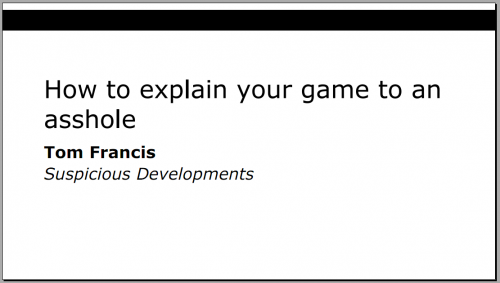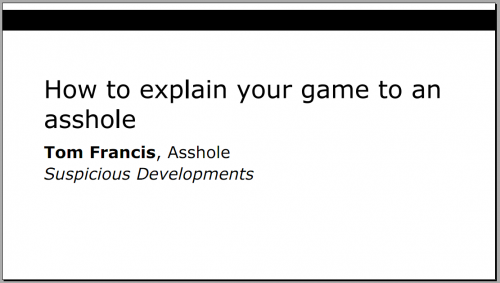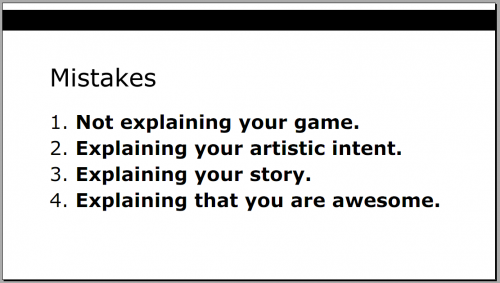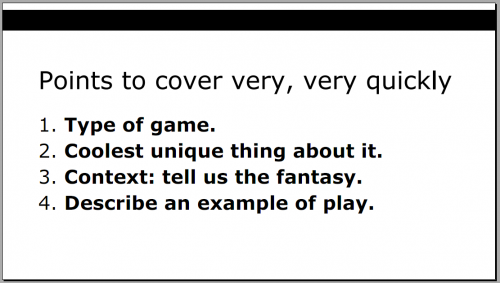TOM FRANCIS
REGRETS THIS ALREADY
Hello! I'm Tom. I'm a game designer, writer, and programmer on Gunpoint, Heat Signature, and Tactical Breach Wizards. Here's some more info on all the games I've worked on, here are the videos I make on YouTube, and here are two short stories I wrote for the Machine of Death collections.
Theme
By me. Uses Adaptive Images by Matt Wilcox.
Search

GDC Talk: How To Explain Your Game To An Asshole
I never went to the Game Developer’s Conference as a journalist, but this year I took a week off and flew out to San Francisco on my own dollar to attend it as a developer. I was mainly there to demo Gunpoint for the expo crowds at the IGF Finalists Pavilion, but I was also invited to give a five-minute talk as part of the closing talk of the Independent Games Summit: the Indie Soapbox Session.
It’s a rapid fire sequence of ten indie devs giving quick talks about what’s getting them fired up at the moment – rants, new ideas or advocacy. I was honoured to be asked, then completely terrified when I saw the room I’d be speaking to, then totally calm milling around on stage beforehand, then debilitatingly nervous when I actually had to speak.
I’m told it went well, by several nice people who ran into me later in the week, and a few others have asked for the slides. I can actually do one better than that – correctly predicting that I’d be unable to form sentences on stage, I wrote my notes for the talk as a full script. Here it is, updated slightly to reflect what I think I actually said.
–
My day job is to write about games, but I’m also making one in my spare time called Gunpoint. It’s my first game, and it’s not finished yet, so I don’t feel qualified to lecture anyone about development.
I want to talk instead about explaining games. It’s easy to screw that up when it’s a game you’re close to, but it’s also really important to get right if you want anyone else to play it. And I had a headstart with this, because I’ve been explaining other people’s games for eight years.
When you’re trying to describe your game – for its website, in an interview, or in a trailer – you can’t assume the reader is a reasonable, interested, intelligent human being. Because in the worst case scenario, your reader might be me. And I’m an asshole.
The current methods of explaining games don’t work for assholes, and I’ll explain why. Then I want to show you how I’ve used my first hand experience of being an asshole to explain games in a way that even an asshole can understand.
The first bad way to explain your game is to not explain it at all. People often put out some raw footage or a screenshot and let it speak for itself.
The trouble is that doesn’t. It probably speaks for itself if you know what it says, but you have no way of imagining how little sense it makes to other people. Sometimes we can’t even tell which thing you’re controlling.
Mistake number two is thinking that to explain your game, you should explain your artistic intent.
So you might describe it as “a game about loss.”
OK, but what the fuck does that mean? For all I know Off-Road Velociraptor Safari might be about loss. I think Minotaur in a China Shop actually is.
But your message, your theme, and your artistic intent don’t tell me anything about how I play the game or what I can do in it that’s interesting or different.
Mistake number three is thinking that explaining your story explains your game. “The people of Darksun are under threat from the elder Gods…”
No-one gives a shit about the people of Darksun except the person who made up the word ‘Darksun’. I’m sure your story’s good, and I’m sure it’s important to your game, but it’s not going to be good in ten words. And if you write more than ten words, no-one’s going to read it.
Mistake number four: stating that your game is good, as if this will persuade us that it is.
No-one has ever read a developer describing their game as “innovative” and thought “Wow, that sounds innovative.”
We have read developers describing their game as innovative and thought, “Wow, they sound like a tool.”
Those are the ways that don’t work. So how do you explain something nuanced and cool to an impatient asshole like me?
You have to get to the point, incredibly quickly, in plain and simple language.
In fact, you have to get to four points, in about three sentences, or we just stop reading.
Point number one is to tell us what type of game it is.
You don’t have to stick to traditional genres, but try to use a word that reflects what you actually do in the game. Maybe it’s not a platformer, but it’s a “2D exploration game.”
Point number two, before you even finish your first sentence, is to tell us the coolest unique thing about it.
And you can summarise drastically. We don’t need to know how it works, but we want to know why it’s cool.
The main mechanic in my game is hard to explain in eight words, but if I say “you can rewire its levels to trick people,” you get an idea.
Point number three is to give us some context: who am I, where am I, what am I trying to do?
The plot will never sound good in ten words, but the fantasy might. You’re a spy? You’re a god? You’re saving kittens? You’re a kitten-god saving spies? All those things are cool.
By that point we should have an overview, but it might be a bit dry. So point number four is to give us an example of how it plays.
Describe a moment the player can experience that’s typical of the game, and illustrates the best of what you’ve just told us.
If you say it’s a game about possessing your enemies, I’m interested. But if you tell me I can possess an enemy, throw him into a friend, and knock them both into a landmine before I switch back to my own body and watch them blow up – I’m sold.
If you can do that, you’re done.
And when you read it back to yourself, it doesn’t actually sound like it was written for an asshole. It just sounds like it was written with a respect for the reader’s attention.
The truth is that most of your readers aren’t assholes like me, they’re intelligent, reasonable people. But reasonable people still respond better to writing that values their time, and doesn’t waste it to gratify the writer’s pretensions.
This isn’t really about indie versus mainstream, or arthouse versus commercial. It’s just about communicating efficiently enough that everyone who would like your game ends up playing it. I think it’s a shame when that doesn’t happen.
Thanks!



